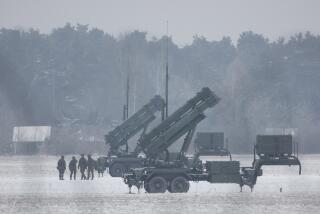Both Railroads, Military Blamed for Errors : Army Overcharged Millions on Transport Bills
- Share via
WASHINGTON — Railroad companies have overcharged the Army millions of dollars for shipping trainloads of tanks and equipment to its California desert training center, and sloppy Army auditing procedures failed to spot the overcharges for years, according to documents obtained by the Washington Post.
The overcharge problems became so extensive that at one point senior Army officials were concerned that some troop units would be forced to reduce training schedules at the National Training Center at Ft. Irwin, Calif., to compensate for the financial losses, according to federal officials investigating the problems.
The Army has found $5 million in railroad fee overcharges for moving military equipment to the NTC in random audits of bills paid during the past five years, according to Barry Morris, spokesman for U.S. Forces Command at Ft. McPherson, Ga. He said military officials are continuing their 2 1/2-year investigation.
“We’re looking at every government bill of lading from 1982 onward,” Morris said. “We’re still finding overcharges. . . . That’s not the railroads’ money. It’s the taxpayers’.”
Government auditors involved in the case said overcharges are pervasive throughout the transportation industry. The General Services Administration, which is responsible for reviewing all transportation bills paid to commercial carriers by government agencies, collected approximately $70 million last year in overcharges by railroads, airlines and truckers, according to William Marshall, deputy assistant commissioner for transportation audits.
Officials representing the two railroad companies involved in the Ft. Irwin cases--the Union Pacific Railroad and the Atchison, Topeka & Santa Fe Railway Co.--confirmed that the Army had been overcharged in many of the cases but blamed accounting mistakes by both the railroads and the Army.
“We’re not contesting the overcharges,” said a spokesman for Union Pacific. “There were errors on both sides of the fence.”
Ft. Irwin auditors reported that railroad companies were charging the Army round-trip rates for one-way service in some cases and routinely charged the military for dozens more rail cars than were ordered for the exercises.
The largest percentage of overcharges occurred when the railroads billed the Army for more rail cars than it ordered. Under most of the military’s contracts, the railway can substitute different-sized rail cars than those ordered if the rail carrier doesn’t have the proper number of the requested cars available. The railway, however, is supposed to charge the Army only for the cars that it ordered.
Army documents also blame some of the overcharges on sloppy record-keeping by Army officials responsible for drafting and monitoring bills for the railroad shipments, which can involve 400 to 500 rail cars on some of the larger training exercises. Army transportation officers frequently signed the bills for the higher amounts without comparing them to requested orders, according to Forces Command’s Morris.
“Yes, we were part of the problem,” Morris said. He added that Forces Command officials have issued orders for improving accounting procedures and training for the military’s transportation officers.
The GSA’s Marshall said the Army has “cleaned up” many of its problems but added that the Army is still so concerned about overcharges that it has asked the GSA to examine every railway bill for the NTC before it is paid. The GSA usually audits transportation bills only after they are cleared and paid by a federal agency.
Although both the railroads and the Army are scrutinizing the bills more closely, Army and GSA officials say they continue to find overcharges.
Army officials said the overcharges involving rail shipments to the training center have ranged from a few thousand dollars per trip to $405,458 in one case. Officials said the huge amount of equipment shipped to Ft. Irwin for the exercises multiplied even the smallest overcharges into large sums of money.
Frequently Army units move their own weapons and equipment--everything from trucks to tanks--to the high-technology “battlefield” where they compete against simulated Soviet troops. For some units the movement of the heavy equipment is part of their training.
The NTC is considered to be one of the most advanced military training fields in the world. Budget and time constraints strictly limit the number of units that can train at the facility. The Army last year spent $46 million to transport equipment to and from Ft. Irwin, officials said.
More to Read
Sign up for Essential California
The most important California stories and recommendations in your inbox every morning.
You may occasionally receive promotional content from the Los Angeles Times.













